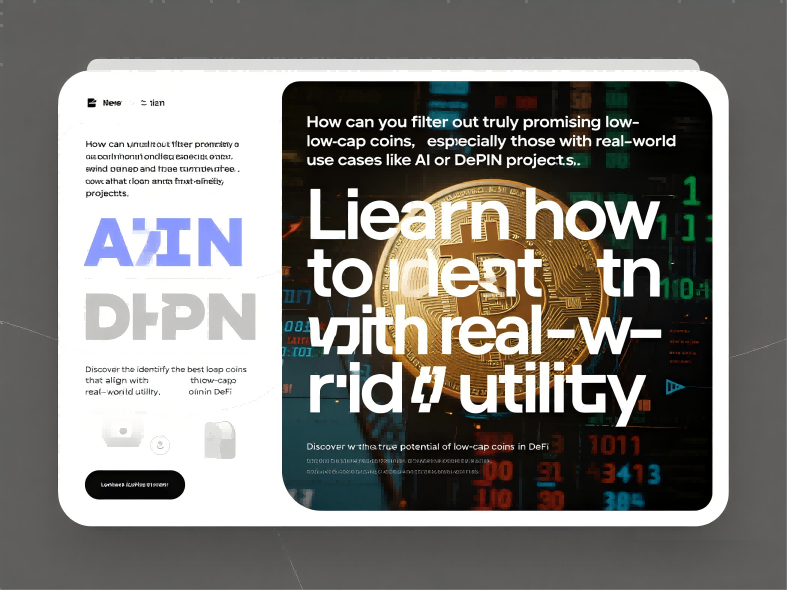In a world where crypto headlines are often dominated by Bitcoin and Ethereum, it’s easy to overlook the smaller players. Yet, many traders quietly know that the real game-changers often emerge from the shadows of low-cap coins. The challenge is clear: how do you separate hidden gems with true utility—like AI-powered platforms or DePIN (Decentralized Physical Infrastructure Networks)—from the endless stream of speculative tokens? Think of it as panning for gold; the glitter might catch your eye, but only a few nuggets hold lasting value.

Not every low-cap project is destined to grow beyond its Telegram group. The coins worth watching tend to solve real-world problems. AI-driven tokens, for example, are creating bridges between decentralized finance and machine learning, opening possibilities for smarter automated trading strategies. DePIN projects, on the other hand, reimagine how we build and share infrastructure—whether it’s decentralized wireless networks or distributed storage.
The key here is practicality. If a coin’s whitepaper is loaded with jargon but no clear use case, it’s probably smoke and mirrors. Projects that show integrations with real businesses, user adoption, or developer engagement usually stand on firmer ground.
Filtering promising low-cap coins often comes down to observing signals beyond the hype:
As a trader, paying attention to these signals helps avoid the classic trap of coins that pump overnight and vanish just as quickly.
Low-cap coins come with volatility that rivals commodities, forex, and even meme stocks. Unlike traditional assets like gold or indices, these coins can swing 30% in a single day. While that might sound intimidating, it’s also where opportunity lives. Using CFDs (Contracts for Difference) or perpetuals allows traders to capitalize on both upward and downward moves without needing to hold the coins themselves.
Risk management is crucial here. Leverage can magnify gains, but it can also accelerate losses. Smart traders often set tight stop-losses, diversify across forex, stocks, and crypto CFDs, and rely on charting tools to track momentum.
The rise of low-cap coins is tied to the broader Web3 narrative. Decentralized finance has already broken open the gates for peer-to-peer trading, but it also faces challenges like liquidity fragmentation, security vulnerabilities, and regulatory uncertainty. Yet, projects rooted in AI or DePIN are carving out spaces where decentralized solutions meet practical needs.
Looking forward, smart contracts and AI-driven trading tools are expected to push this trend further. Imagine trading bots that don’t just follow technical signals but also analyze social sentiment or global events in real time. That’s the frontier where low-cap coins can shine—because they’re nimble enough to innovate faster than legacy giants.
For traders, the goal isn’t just identifying coins with potential—it’s building a framework to trade them responsibly. Combining technical analysis, fundamental research, and CFD trading tools can provide a balanced approach. Platforms that offer zero-commission trading, built-in charting software, and capital protection features are becoming essential for navigating this high-risk, high-reward territory.
Filtering out truly promising low-cap coins is less about chasing the next viral meme token and more about looking at the intersection of technology, adoption, and timing. AI and DePIN projects are leading the way, showing that small-cap innovation can carry weight in the real economy.
For anyone exploring this space, think of the mantra: “Trade smart, trade secure, and trade where innovation meets utility.” Low-cap coins might be obscure today, but with the right strategy, they could be tomorrow’s headline makers.
Spot trading is straightforward: you buy an asset like Bitcoin, Tesla stock, or gold, and you profit if the price goes up
Read MoreTrading has always carried an air of possibility. The idea of turning a well-timed decision into a life-changing profit a
Read MoreStart your CFD trading
Your All in One Trading APP PFD